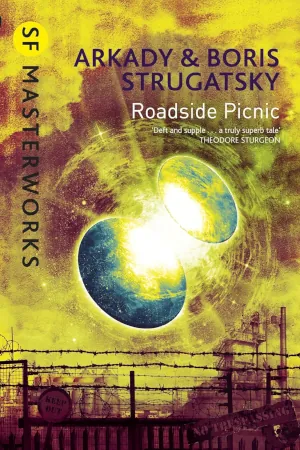
Top 100 Fantasy Books Of All Time
Looking for great fantasy books? Take a look at the 100 pages we rate highest

In a near-future, unnamed part of the world, an alien race has visited the Earth... only they had no interest in establishing any contact with humans. They came, they stayed a short while, and left almost immediately. Perhaps they didn’t view humans as worthy of interaction. Perhaps their decision was far beyond our psychological capacity for reason. Perhaps Earth was just a pit stop on their way to the next destination. But what they left behind has changed the fate of humanity forever.
Before leaving the planet, the visitors touched down in six areas of the world. These six areas are referred to as Zones, and they are as big as cities. Inside these Zones are akin to an alien junkyard; a trash heap. Trinkets and baubles and remnants of nonsensical life forms are left in its wake, tempting the brave and foolish to enter the Zones, steal what remnants they can, and sell them off to the black market for profit. These foolish men and women are called Stalkers, and have introduced to the world such alien artifacts as perpetual batteries, plasma-filled energy tubes, deadly hell slimes, even a mythical Golden Sphere that is rumored to grant human wishes. The dangers of traversing these Zones are too numerous to count, but our main character Redrick has a penchant for staying alive. Not only staying alive, but thriving in the Zone that has eclipsed his hometown.
Redrick is a criminal, an upstart, a man chased by the police for actions that we are not privy to. We are treated to his arrogance, his impatience with his peers, and his disgust for his lot in life. He hates how the world has reacted to the Visit, and he is constantly drawn to chaos. He is pushed and pulled by those in power, yet feels the most alive while daring death (and much worse) with each excursion into the nightmarish Zone. He views the world as scum, being run by profiteers who step on each other to work towards whatever power-crazed goals they have in mind. Yet Redrick continues his black-market business, even trains others to do so, as it’s the only thing he knows how to do well. But the requests for a retrieval of certain items starts to weigh heavily on Redrick’s conscience: what good could any of this truly do, if released into the world? Should any of these things be toyed with? The consequences of Red’s decisions start to pile up higher and higher, risking his family, his life, and perhaps the fate of the world itself.
Written in 1972, Arkady and Boris Strugatsky’s Roadside Picnic is rife with political allegory and the inner struggles of a ‘Russian lit’ protagonist. The tone of the story feels like an amalgam of Fyodor Dostoyevsky and Stanislav Lem, covering the nature of humanity’s desires and its consequences, as well as the philosophical limitations of intelligence when introduced to the existence of extraterrestrial life. It’s heady stuff. There is a section of the story when two characters sit in a bar and discuss the definition of intelligence, the likelihood of a higher power, the meaning of First Contact, the application of technologies, and what separates us from those species that we rank against ours. They throw back shot after shot of cognac, and their arguments become more in depth, but ultimately lead to nothing conclusive. Millions of years of evolution, interaction with alien technologies far superior to our own, and humankind is still left clueless while we continue to eat ourselves alive.
In a newly-published foreword to the book, Ursula Le Guin states that “science fiction lends itself to imaginative subversion to any status quo.” In Roadside Picnic, there no longer is a status quo: the world is in a constant state of flux, yet some familiar societal tropes remain: profiteers capitalize on the suffering of others, while the world descends deeper into a pit fear and doubt. There’s a sick sense of unease and tension in the story that is usually met with braggadocio or disbelief, as if we cannot face one of our greatest fears: are we optimistic about our lot in the cosmos, or are we not even worth contacting in the first place?
Review by Adam Weller
Randall Krekelberg from Australia
An absolutely PHENOMENAL book! I have watched and loved Stalker a LOT throughout the years, having been introduced to it as a young teen, and it was due to this that I first learned it had been adapted from this novel. To be honest, I wasn't expecting anything extraordinary going in, but man did these guys absolutely blow me away. I can't believe I'm saying this but - despite the fact that I still absolutely I love and admire the cinematic masterpiece Tarkovsky created - there really is no comparison. This book is in a league of its own, and the Strugatsky brothers deserve way more recognition than they have received (even to this day). Here's to hoping that changes one day soon.10/10 (2021-02-21)
9.8/10 from 2 reviews

Looking for great fantasy books? Take a look at the 100 pages we rate highest

There's nothing better than finding a fantasy series you can lose yourself in

Our fantasy books of the year, from 2006 to 2021